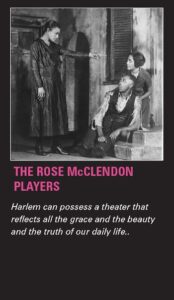
The Rose McClendon Players
*The Rose McClendon Players are celebrated on this date in 1935. This was a theater group founded in Harlem, New York.
The Rose McClendon Players lived up to the outstanding legacy left by their legendary namesake, Rose McClendon. While working with the Federal Theatre Project, she developed her vision of a Black theatre company. Together with Dick Campbell, she founded the Negro People's Theatre in 1935. Officers of the small thirty-five-member company were Morris McKenney (chairman and director of the executive board), Campbell (vice-chairman), Lena Bernstein (play reader), and Alston Burleigh (musical director).
The company produced one play, Odets' Waiting for Lefty, before McClendon's untimely death from pneumonia in 1936. Two years later, Campbell, his wife, actress Muriel Rahn, and George Norford established the Rose McClendon Players in Harlem in her honor. It consisted of a group of talented artists who were committed to producing plays written by and for Black people. One of the signature productions of the Rose McClendon Players was Abram Hill's 'On Strivers Row,' which ran for sixteen performances.
Everyone involved, from the group's founders to the actors and actresses themselves—Fred O'Neal, Ossie Davis, Helen Martin, Maxwell Glanville, Claire Leyba, and Freddie Carter—all had a demonstrated commitment to theater in Harlem. In his book Black Drama, Loften Mitchell wrote that "Mr. (Dick) Campbell stands as one of the truly majestic figures of the 1930s. He was there dreaming of a bright future for the Negro theater worker, just as James Hewlett did in the early 19th Century, Lester Walton and Eddie Hunter in the early part of the 20th Century, and the Lafayette Players after World War I."
With its impressive line-up of talent, the Rose McClendon Players became a major contributor to Harlem theater until 1942.